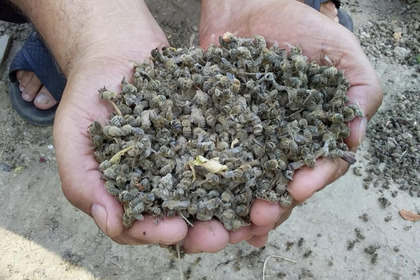Bees are dying in Uzbekistan, presumably due to the indiscriminate spraying of cotton fields with potent chemicals and the lack of systematic monitoring, the Gazeta said in story.
Beekeepers say the problem is getting worse every year, resulting in a decline in the number of honey producers and an increase in environmental risks.
The Ministry of Agriculture, in turn, said that cases of bee deaths have only been recorded in a certain area of the Fergana province and may be related to diseases of the bee colonies themselves. The department added that it has created a working group to determine the causes.
Sherzod Mirzamakhmudov, a resident of the Yazyavan district of the Fergana province, has been engaged in beekeeping for 10 years. By 2025, he had 80 bee colonies.
This year, he placed all his bees around a cotton field to pollinate the cotton plants, but some of the insects died, presumably from toxic chemicals sprayed by farmers to control pests.
“Since there are no hills, mountains or gardening in our area, we only take the hives to the cotton fields. The season starts around June 10 and lasts until the end of August, meaning that for two months the bees collect nectar from the cotton flowers and pollinate them. This year, we also took the hives to the outskirts of the fields in the village. Unfortunately, from June 29 to July 2, 30 bee colonies died due to the toxic chemical sprayed on the cotton plants,” he said.
According to Sherzod Mirzamakhmudov, one hive can accommodate 2-3 bee colonies. On average, one colony contains about 30-40 thousand bees. In large families, their number can reach 60-70 thousand. "Now imagine how many bees I kept were poisoned and died," the beekeeper says. He admits that cases of bee deaths have been observed in previous years, but never on such a scale.
"We thought that farmers needed cotton, and we needed honey. But this time, because of the mass death, it is very disappointing. I have never seen such a plague. This season, other beekeepers have also seen a similar terrible situation. In the Yazyavan, Altyaryk, Kushtepa districts, the situation is also serious, thousands of bee families have died," the honey producer added.
This situation has caused serious damage to each beekeeper, he says. According to him, he planned to get an average of 5 kg of honey from each of the 80 bee families by the end of the season and sell it at a wholesale price of 80 thousand soums per kilogram, expecting to earn about 30-35 million soums.
“We incurred expenses for sugar and other needs. Our time and labor were spent on keeping the bees. But everything that was done came to nothing in one month. The condition of the bees in the remaining hives is also not good,” he said.
Beekeeping is an important industry that brings great benefits not only to the family and the state budget, but also to nature, says Sherzod Mirzamakhmudov.
“Bees perform the duty of pollinating agricultural crops and flowers. If they are not pollinated, this will greatly affect the harvest. If farmers treat their crops in the fields in the evening, without using strong poison against pests, and fight them with biological methods, not chemicals, then the harvest will be abundant, and the bees will not suffer,” he explained.
Sherzod Mirzamakhmudov admitted that he is thinking about leaving beekeeping after the mass death of bees this season. “Many of my colleagues share this opinion,” he said. In his opinion, until farmers change their attitude to spraying and watering cotton and wheat, such poisoning will continue. “As a result, beekeeping in Uzbekistan will cease,” he believes.
"Thousands of bee colonies have died"
According to the chairman of the Fergana Province Beekeepers Association Sherzod Suyarkulov, many beekeepers in the Yazyavan, Kushtepa, Altyaryk, Kuva, Rishtan, Uchkuprik and Baghdad districts have suffered this year. Many beekeepers in the Surkhandarya, Kashkadarya, Samarkand, Andijan and Namangan provinces have suffered.
"Wherever cotton was planted, a toxic substance was sprayed everywhere, resulting in the death of thousands of bee colonies," he said.
According to the specialist, his team is compiling a list of beekeepers in Fergana who have suffered from the mass death of bees. To date, more than 3,000 dead bee colonies have been identified.
"Beekeepers spend tons of sugar throughout the year, protect bees from various diseases and work together with their loved ones. Depending on the number of bee colonies, they spend from 30 to 200 million soums. But because of the poison sprayed by the farmer on the cotton, all this work evaporates in a short time. Who will compensate for this damage? A similar situation was observed last year. As a result, people who have been engaged in beekeeping for 30-40 years are leaving the industry," said Sherzod Suyarkulov.
He emphasized that such a mass death of bees could have a negative impact on the country's economy, ecosystem and agriculture in the future.
"The main duty of bees is pollination. Due to the widespread use of chemicals in agriculture, natural external pollinators have almost disappeared. Now the main pollinator is the bee. If the situation continues this way, if the government does not fight this problem, tomorrow the problems will increase. External pollinators will decrease, dozens of trees and plants will practically stop bearing fruit without pollination. This will lead to the disappearance of wild vegetation and soil erosion,” he added.
Sherzod Suyarkulov noted that the Beekeepers Association constantly works and cooperates with clusters and farmers. But there is no responsibility or control in spraying the preparations.
“We now suspect that farmers are using neonicotinoids to combat pests. This poison affects the nervous system of bees. The use of such a drug is prohibited throughout the world. It would be good if all farmers approached the processing process systematically and consciously, used methods that do not affect bees, or biological methods,” says the head of the Fergana Beekeepers Association.
“The beekeeping industry needs serious reforms”
Tashkent beekeeper Farrukh Musayev notes that people are forced to take their bees to cotton fields due to the lack of other options.
"Most of the hills and highlands are rented out, gardens and other lands have owners - if you bring hives there, they will be against it. If you take them to desert areas, there is no water, drought. The world of wild vegetation is also shrinking. The cotton field has become the only source for beekeepers," he said.
However, due to improper field cultivation by farmers and the lack of proper control in this regard, cotton fields are becoming unprofitable, he says. According to him, as a result, there are beekeepers who suffer losses of up to 30 thousand dollars. "Who will cover this? I ask our government to protect those who took out a loan, sold their car and invested everything in beekeeping," he said.
Farrukh Musayev believes that the state should support beekeeping, "otherwise the industry will not develop and will die."
"If you want to create something new in this area and engage in selection, there is a problem with the land. I have often visited Russia, Turkey, Ukraine, Georgia. There, much attention is paid to the plant world and pollination, thanks to which beekeeping is also significantly developed. Honey producers should be provided with subsidies. This practice exists all over the world, even among our neighbors,” says Musayev.
In addition, he emphasizes the need to train both beekeepers and veterinary specialists responsible for this area, and, if necessary, abroad. Because “now the Veterinary Committee does not deal with beekeepers at all, does not care about the situation, what diseases,” the beekeeper noted.
“It is necessary to establish cooperation with neighboring countries - Kazakhstan, Kyrgyzstan and Russia. We need to export our bees there for pollination. This is beneficial in all respects: you get honey, you multiply bee colonies, and you receive currency for pollination. But we have a ban on beekeepers leaving and entering. There is demand from Russia - every year they invite us to pollinate pistachios and rapeseed. But because of the ban, we cannot leave," said Farrukh Musayev.














